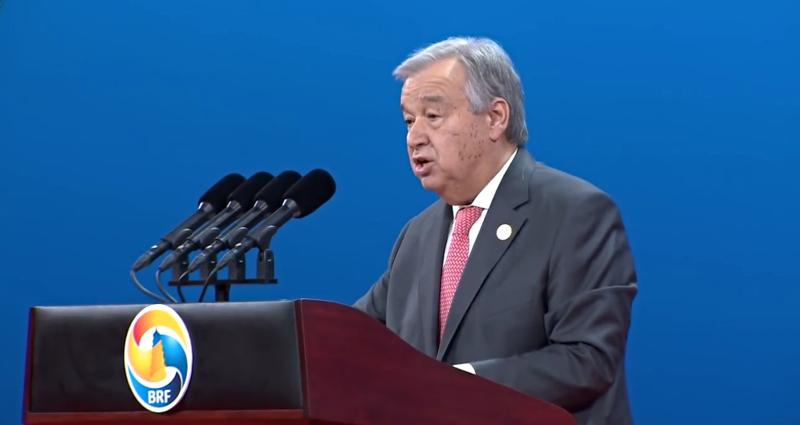
A former employee of the United Nations has accused the intergovernmental organization of deliberately neglecting to address China’s alleged human rights abuses due to the country’s growing diplomatic and financial influence in the global arena.
Emma Reilly, a human rights attorney who worked at the U.N. Office of the High Commissioner for Human Rights (OHCHR), was fired last November after allegedly facing years of retaliation within the organization, reported The Epoch Times.
Reilly’s revelation reportedly dates back to early 2013, when her boss, the chief of the OHCHR’s Human Rights Council Branch, allegedly asked her to ensure that a list of names of Chinese dissidents were sent over to Beijing.
The instruction shook Reilly, who then decided to lodge a report to her boss’ superior.
.@antonioguterres, @mbachelet, all I ask is that you verifiably stop handing names of dissidents to #Beijing, investigate the consequences, and hold people accountable.
I’m not asking for my job back, I’m asking you to stop endangering people.
— Emma Reilly (@EmmaReillyTweet) February 17, 2022
When her first few attempts failed, Reilly took the matter up to the U.N. High Commissioner for Human Rights, as well as the U.N. Ethics Office.
“That’s how deep the rot goes,” she told The Epoch Times in 2020. To her horror, the head of the Ethics Office allegedly replied, “We both know how the U.N. works,” before suggesting that Reilly “should use the information to bribe the Chief of Office to ensure a promotion.”
Determined to find justice, Reilly said she then took the matter to officials in the European Union. But her boss allegedly denied the accusations.
Due to her actions, Reilly said she faced years of “extreme retaliation” within the U.N.
“I have been ostracized, deprived of functions, forcibly transferred to non-existent posts without functions, defamed to journalists and NGOs, and more,” she told The Epoch Times.
Despite this, Reilly remained steadfast in her aim to expose the scheme. “It was so clearly the opposite of what the human rights office of the U.N. should be doing.”
Beijing, which currently is hosting the 2022 Winter Olympics, was hit with diplomatic boycotts from several countries weeks before the event. These states, led by the U.S., primarily denounced China’s alleged human rights abuses in Xinjiang, home of its Uyghur population.
[embedded content]
Amid the chorus of boycotts, United Nations Secretary-General Antonio Guterres decided to attend the event’s opening ceremony. China previously warned that countries joining the boycott would “pay the price,” according to the South China Morning Post.
In a new interview with The Epoch Times, Reilly revealed that there is a U.N. policy preventing the secretary-general and other senior officials from meeting anyone that “might upset China.” She also claimed that the organization is struggling to finish a report about Xinjiang because officials have been unable to visit the region.
“There is an actual policy that the High Commissioner for Human Rights, the secretary-general, and various other senior officials do not meet… with Uyghurs, Tibetans, Taiwanese, Falun Gong, anyone that might upset China,” she told the outlet’s “China Insider” program on Feb. 9. “I think when the genocide is on course… and you’re the secretary-general of the United Nations, just maybe ask for the genocide to stop and not just for a guided tour of it.”
Reilly also suggested that reports claiming that the U.N. had acknowledged China’s human rights are misleading. She pointed out that the information does not actually come from the organization, but from independent experts.
“If you … look at a lot of the reports that come out in the press that says, ‘The U.N. said this about China’s human rights record,’ it’s always an independent expert that said that. So, it’s not actually someone from the U.N. It’s a person who is independent from the U.N., but appointed as an expert in a particular area to look into that,” Reilly told The Epoch Times.
Last December, an independent tribunal in London ruled that China has committed genocide against Uyghurs and other ethnic minorities in Xinjiang. The 63-paged report was based on both expert and witness testimonies.
The detainees, housed in what China calls “re-education centers,” were forced to take medications that affect reproductive functioning, the tribunal said. Pregnant women, whether detained or not, were forced to have abortions even “at the very last stages of pregnancy,” while some babies were born but eventually killed.
Based on the information and experiences she had gathered during her period of employment, Reilly believes the U.N. is glossing over China’s abuses due to its growing diplomatic and financial influence. She cited Beijing’s Belt and Road Initiative (BRI), which presumably works for the nation’s benefit in the 47-member Human Rights Council (HRC).
[embedded content]
The BRI has been criticized for being a form of “debt-trap diplomacy.” AidData, an international development research lab based at William & Mary’s Global Research Institute, reported last September that the initiative’s 13,427 projects — which span 165 countries and are worth $843 billion — show a major increase in “hidden debt.”
“China has quickly established itself as the financier of first resort for many low-income and middle-income countries, but its international lending and grant-giving activities remain shrouded in secrecy,” said Ammar A. Malik, a senior research scientist at AidData.
“Beijing’s reluctance to disclose detailed information about its overseas development finance portfolio has made it difficult for low-income and middle-income countries to objectively weigh the costs and benefits of participating in the BRI. It has also made it challenging for bilateral aid agencies and multilateral development banks to determine how they can compete — or coordinate and collaborate — with China to address issues of global concern.”
While some are skeptical of China’s intentions, Guterres leads the praise for BRI’s supposed alignment with the U.N.’s Sustainable Development Goals (SDGs).
[embedded content]
“Both strive to create opportunities, global public goods and win-win cooperation. And both aim to deepen ‘connectivity’ across countries and regions: connectivity in infrastructure, trade, finance, policies and, perhaps most important of all, among peoples,” Guterres said at the opening of the Belt and Road Forum in 2017.
In 2016, China also pledged $20 million a year for 10 years to the U.N.’s newly-established Peace and Development Trust Fund. Then-Secretary General Ban Ki-moon said he was “extremely appreciative” of the “generous contribution” to the United Nations, according to Reuters.
Today, its price for the U.N., Reilly believes, is Guterres’ silence.
“Now, they obviously think they’re getting something out of that. And I would suggest that that thing could be his silence,” she told The Epoch Times.
Featured Image via United Nations
Enjoy this content? Read more from NextShark!
2 Indian Buffalo Racers Reportedly Beat Usain Bolt’s 100 Meter Record
Foreigners Are Reportedly Facing Racism and Xenophobia in China
GoFundMe created for Lyft driver assaulted by rider with microphone stand in California
Saudi Rapper Faces Jail for Saying Women Are ‘Powerful and Beautiful’ in Music Video




